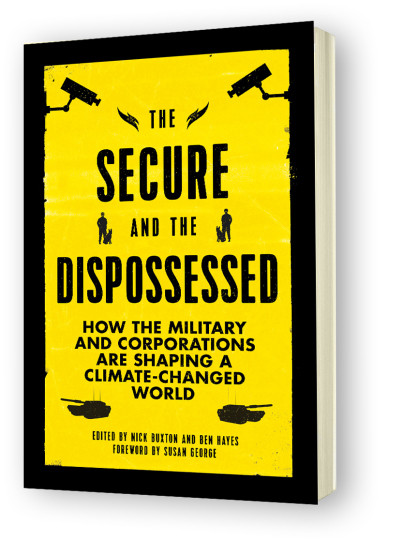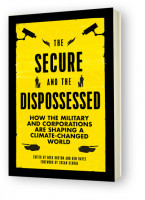Securing the Climate of Capitalism
Topics
Ben Hayes and Nick Buxton, editors of the forthcoming book The Secure And The Dispossessed, ask: do we really want the military and corporations to lead on how we deal with the climate crisis?


John / Flickr
For anyone interested in US leadership on climate change, the Democratic debates last week were a welcome relief from the freak show of the Republican alternative. At least no-one pretended that there’s no such thing as man-made climate change, or as billionaire joke candidate Donald Trump put it, that it was something to be encouraged. Instead self-declared socialist Bernie Sanders was unequivocal when asked what the US’ greatest national security threat was: “The global crisis of climate change”.
Declaring climate change a national security threat has become a favoured way of arguing for progressive environmental policies. Indeed, the idea is now vigorously promoted by socialists, greens and democrats alike.
In May 2015 this year, President Obama, addressing graduating coastguard cadets in Connecticut, said: “Climate change constitutes a serious threat to global security, an immediate risk to our national security and, make no mistake, it will impact how our military defends our country. And so we need to act— and we need to act now.” UK Prime Minister David Cameron made a similar speech in 2014, saying, “Climate change is one of the most serious threats facing our world. And it is not just a threat to the environment. It is also a threat to our national security, to global security…”
But does it make sense to treat climate change as a security threat – and what are the implications? As activists involved in the environmental justice and civil liberties movements, we started exploring this issue in 2011 and our new book, The Secure and the Dispossessed, is the culmination of that research.
It seemed to us no coincidence that in the aftermath of the disastrous UN climate meetings in Copenhagen in 2009 – in which the world’s leaders abdicated their responsibility to act – leading international security actors like the Pentagon started talking about a new “age of consequences” in which “altruism and generosity would likely be blunted.” It was time to wonder whether the world’s elites had decided it was easier to try and manage the consequences of climate change, rather than address its causes.
Many environmentalists have jumped straight into bed with the securocrats and the generals. Peter Lehner of the US Natural Resources Defense Council, for example, has praised the US military for their “vision, leadership, and hard-nosed practicality in dealing with climate change.” The organisation even runs projects with the US Department of Defense to help improve energy efficiency on the sprawling vast global network of US military bases.
It only takes a quick dip into the new climate security strategies, such as the Pentagon’s 2007 report, Age of Consequences, or the 2008 EU report, though, to realise that they are based primarily on maintaining the status quo. That means securing wealth, supply lines, and profits for those who already have resources and building barriers, walls and bases to control those without. In the context of climate change, in which those least responsible for the crisis will be most affected by its impact, this approach heaps injustice upon injustice. In place of solidarity or real action to prevent worsening climate change, those most affected are treated not as victims of the most developed nations on the planet, but as threats to them.
Dystopian preparations by the state are reflected in the corporate arena. Where we see a future climate crisis, many companies see only opportunity: oil firms looking forward to melting ice caps delivering new accessible fossil fuels; security firms touting the latest technologies to secure borders from ‘climate refugees’; or investment fund managers speculating on weather-related food prices – to name but a few. In 2012, Raytheon, one of the world’s largest defence contractors, announced “expanded business opportunities” arising from “security concerns and their possible consequences,” due to the “effects of climate change” in the form of “storms, droughts, and floods”. The rest of the defence sector has been quick to follow.
The implications of a militarised and profit-making approach to climate adaptation and crisis-management are very disturbing – and need to be taken more seriously by anyone concerned with environmental justice, civil liberties and democracy. Ultimately, a security-led approach to climate change not only fails to address the fundamental causes of these crises – it will often exacerbate them. Worldwide the increased focus on food security is already driving increased land grabbing. The diversion of resources into military spending and strategies is preventing much needed investment in crisis-prevention or tackling the root causes of human insecurity.
Fortunately, as the book explores, many social movements throughout the world are actively involved in not only resisting corporate and military strategies of climate adaptation but putting forward and practising alternatives that embody principles of justice, human rights and sustainability. So in the place of calls for food security predicated on the control of food supply by corporations, for example, social movements are advocating food sovereignty and helping communities develop strategies to cope with climate change and provide healthy food for all.
It is also heartening that even in the face of disaster, the evidence shows that the default human response is not one of selfishness or Hobbesian anarchy, but of people collaborating to support each other. The response of the Occupy movement in the aftermath of 2011’s Hurricane Sandy, which at one point brought together 60,000 volunteers to run amazingly efficient centres across the city for people to donate and receive food and clothing is but one of many examples. They underscore the need to ensure that the climate crisis is faced with compassion, creativity and cooperation, not used as a fillip for further militarisation and divisive ‘security’ policies.


